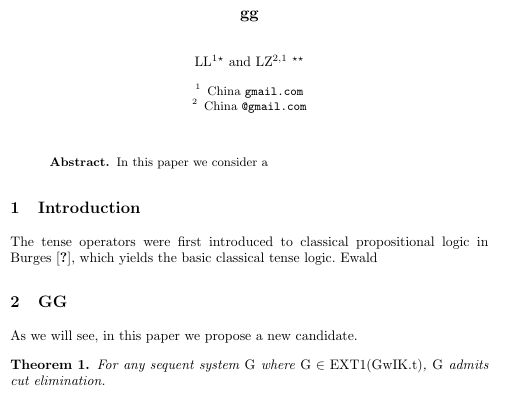我的文件使用\documentclass[runningheads,a4paper]{llncs}这个模板的时候,运行没有报错但是无法生成pdf,请问是怎么回事?
\documentclass[runningheads,a4paper]{llncs}
\usepackage{amssymb}
\usepackage{amsmath}
%\usepackage{cite}
\usepackage{enumerate}
\usepackage{proof}
\usepackage{stmaryrd}
\usepackage{turnstile}
\usepackage{bussproofs}
\usepackage{multirow}
\usepackage{fancyhdr}
\usepackage{graphicx}
\usepackage{stmaryrd}
\usepackage{endnotes}
\usepackage[color,matrix,arrow]{xy}
\usepackage{wrapfig}
\usepackage{bussproofs}
\usepackage{enumerate}
\usepackage{mathrsfs}
\usepackage{amscd}
\usepackage{textcomp}
\usepackage{stmaryrd}
\usepackage{everysel}
\usepackage{dsfont}
\usepackage{mathtools}
\usepackage{bussproofs}
\usepackage{proof}
\usepackage{textcomp}
\usepackage{amssymb}
\usepackage{amsmath,mathrsfs}
\usepackage{graphicx}
\usepackage{type1cm}
\usepackage{times}
\usepackage[marginal]{footmisc}
\begin{document}
\mainmatter % start of an individual contribution
% first the title is needed
\title{\large gg}
% a short form should be given in case it is too long for the running head
\titlerunning{ggg}
% the name(s) of the author(s) follow(s) next
%
% NB: Chinese authors should write their first names(s) in front of
% their surnames. This ensures that the names appear correctly in
% the running heads and the author index.
%
\author{LL\inst{1}%
\thanks{The.}
%\thanks{Mad thanks}
\and LZ\inst{2,1}
\thanks{corresponding author}}
%
\authorrunning{Lin, Lin}
% (feature abused for this document to repeat the title also on left hand pages)
% the affiliations are given next; don't give your e-mail address
% unless you accept that it will be published
\institute{China\\
\email{gmail.com}
\and
China\\
\email{@gmail.com}}
%
% NB: a more complex sample for affiliations and the mapping to the
% corresponding authors can be found in the file "llncs.dem"
% (search for the string "\mainmatter" where a contribution starts).
% "llncs.dem" accompanies the document class "llncs.cls".
%
%\toctitle{Lecture Notes in Computer Science}
%\tocauthor{Authors' Instructions}
\maketitle
\renewcommand{\phi}{\varphi}
\newcommand{\mf}{\mathfrak}
\newcommand{\msf}{\mathsf}
\newcommand{\mbf}{\mathbf}
\newcommand{\mbb}{\mathbb}
\newcommand{\mrm}{\mathrm}
\newcommand{\bu}{\bullet}
\newcommand{\mc}{\mathcal}
\newcommand{\hra}{\hookrightarrow}
\newcommand{\la}{\langle}
\newcommand{\ra}{\rangle}
\newcommand{\imp}{\rightarrow}
\newcommand{\bimp}{\leftrightarrow}
\newcommand{\Imp}{\Rightarrow}
\newcommand{\bd}{\blacklozenge}
\newcommand{\bb}{\blacksquare}
\newcommand{\sub}{\subseteq}
\newcommand{\p}{\prime}
\newcommand{\ol}{\overline}
\newcommand{\ul}{\underline}
\newcommand{\w}{\widehat}
\newcommand{\ve}{\varnothing}
\newcommand{\D}{\Diamond}
\newcommand{\B}{\Box}
\newcommand{\ua}{\uparrow}
\newcommand{\dr}{\downarrow}
\newcommand{\wdg}{\wedge}
\newcommand{\vph}{\varphi}
\newcommand{\md}{\models}
\newcommand{\mdp}{\models ^+}
\newcommand{\mdn}{\models ^-}
\newcommand{\bl}{\blacklozenge}
\newcommand{\bs}{\blacksquare}
%%%%正文部分
\begin{abstract}
In this paper we consider a
\end{abstract}
\section{Introduction}
The tense operators were first introduced to classical propositional logic in Burges \cite{Burgess1984}, which yields the basic classical tense logic. Ewald
\section{GG}
As we will see, in this paper we propose a new candidate.
\begin{theorem}
For any sequent system $\mrm{G}$ where $\mrm{G}\in \mrm{EXT1}(\mrm{GwIK.t})$, $\mrm{G}$ admits cut elimination.
\end{theorem}
\bibliographystyle{splncs04}
\bibliography{LORI4}
\end{document}
运行结果:
从你给的代码中,我删了一堆东西,然后编译通过了:
```tex
\documentclass[runningheads,a4paper]{llncs}
\newcommand{\mrm}{\mathrm}
\begin{document}
\mainmatter % start of an individual contribution
% first the title is needed
\title{\large gg}
% a short form should be given in case it is too long for the running head
\titlerunning{ggg}
% the name(s) of the author(s) follow(s) next
%
% NB: Chinese authors should write their first names(s) in front of
% their surnames. This ensures that the names appear correctly in
% the running heads and the author index.
%
\author{LL\inst{1}%
\thanks{The.}
%\thanks{Mad thanks}
\and LZ\inst{2,1}
\thanks{corresponding author}}
%
\authorrunning{Lin, Lin}
% (feature abused for this document to repeat the title also on left hand pages)
% the affiliations are given next; don’t give your e-mail address
% unless you accept that it will be published
\institute{China\
\email{gmail.com}
\and
China\
\email{@gmail.com}}
%
% NB: a more complex sample for affiliations and the mapping to the
% corresponding authors can be found in the file “llncs.dem”
% (search for the string “\mainmatter” where a contribution starts).
% “llncs.dem” accompanies the document class “llncs.cls”.
%
%\toctitle{Lecture Notes in Computer Science}
%\tocauthor{Authors’ Instructions}
\maketitle
%%%%正文部分
\begin{abstract}
In this paper we consider a
\end{abstract}
\section{Introduction}
The tense operators were first introduced to classical propositional logic in Burges \cite{Burgess1984}, which yields the basic classical tense logic. Ewald
\section{GG}
As we will see, in this paper we propose a new candidate.
\begin{theorem}
For any sequent system $\mrm{G}$ where $\mrm{G}\in \mrm{EXT1}(\mrm{GwIK.t})$, $\mrm{G}$ admits cut elimination.
\end{theorem}
\bibliographystyle{splncs04}
\bibliography{LORI4}
\end{document}
```

一周热门 更多>